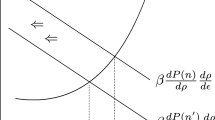Abstract
When an arbitrator lacks complete information about the dispute in question, he may have to turn to the disputants themselves to provide information. If they know how the information is to be used, they may have incentives to hide the truth. By using the players reports as checks on each other, a completely ignorant arbitrator of a dispute between two completely informed players can induce truthful revelation in the sense that the truth is a Nash equilibrium of the game which the arbitrator's decision process imposes on the players. Such a scheme may be used in conjunction with any one from a class of functions which select Pareto-optimal, individually-rational outcomes in two-person normal-form games.
Similar content being viewed by others
References
Groves, T., andJ. Ledyard: Optimal Allocation of Public Goods: A Solution to the ‘Free Rider’ Problem. Econometrica45, 1977, 783–809.
Groves, T., andM. Loeb: Reflections on ‘Social Costs and Benefits and the Transfer Pricing Problem. Journal of Public Economics5, 1976, 353–359.
Harsanyi, J.: Approaches to the Bargaining Problem Before and After the Theory of Games: A Critical Discussion of Zeuthen's, Hicks', and Nash's Theories. Econometrica24, 1956, 144–157.
Harsanyi, J., andR. Selten: A Generalized Nash Solution for Two-Person Bargaining Games with Incomplete Information. Management Science18, 1972, P80-P106.
Kalai, E.: Proportional Solutions to Bargaining Situations. Econometrica45, 1977, 1623–1630.
Kalai, E., andM. Smorodinsky: Other Solutions to Nash's Bargaining Problem. Econometrica43, 1975, 513–518.
Luce, D., andH. Raiffa: Games and Decisions. New York 1957, Chapter 6.
Nash, J.: The Bargaining Problem. Econometrica18, 1950, 155–162.
—: Two-Person Cooperative Games. Econometrica21, 1953, 128–140.
Owen, G.: Game Theory. Philadelphia 1968, Chapter 7.
Raiffa, H.: Arbitration Schemes for Generalized Two-Person Games. Annals of Mathematics Studies 28, ed. by Kuhn and Tucker. Princeton 1953, 361–387.
Rosenthal, R.: An Arbitration Model for Normal-Form Games. Mathematics of Operations Research1, 1976, 83–88.
Schelling, T.: The Strategy of Conflict. London 1960.
Smith, V.: Mechanisms for the Optimal Provision of Public Goods. Technical Report, Department of Economics, University of Arizona.
Zeuthen, F.: Problems of Monopoly and Economic Warface. London 1930.
Author information
Authors and Affiliations
Additional information
Research supported by Nat. Sc. Found. Grant No. SOC-7401790.
Rights and permissions
About this article
Cite this article
Kalai, E., Rosenthal, R.W. Arbitration of two-party disputes under ignorance. Int J Game Theory 7, 65–72 (1978). https://doi.org/10.1007/BF01753235
Received:
Revised:
Issue Date:
DOI: https://doi.org/10.1007/BF01753235




